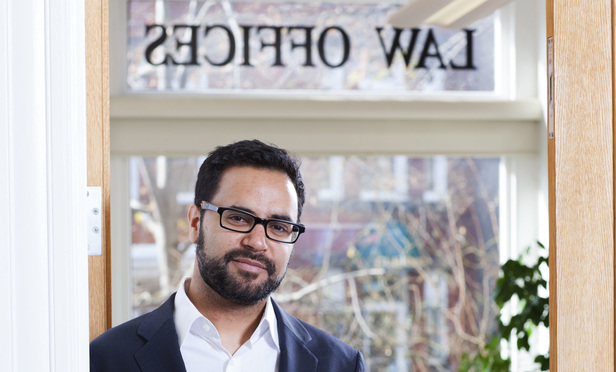Listen to our webcast conversation: Lawyering in the Age of Trump
Other ongoing cases include representing a Trump University alumna who is challenging the approval of a $25 million class action settlement that cut off opt-out rights. The firm is defending a class action provision in the U.S. Labor Department’s so-called “fiduciary rule” after the Trump-led Justice Department changed its position. Last year, Gupta Wessler filed an amicus brief on behalf of public interest groups supporting the Obama administration’s Clean Power Plan. That case is now on hold in the U.S. Court of Appeals for the D.C. Circuit as the Trump administration reviews the regulations.
“We’re small and we don’t want to jump on issues just because they’re interesting, high-profile issues involving Donald Trump,” Gupta said. “There are so many great lawyers available to do that litigation. The cases we work on are where they intersect with issues we care about. I don’t want to be just the anti-Trump firm.”
This month, the firm brought on a new lawyer—Joshua Matz, of counsel and a former clerk to Justice Anthony Kennedy for the 2014-2015 term. The blog Above the Law once described Matz as “nothing short of a legal genius (even by SCOTUS clerk standards).”
Matz joined Robbins Russell Englert, Orseck, Untereiner & Sauber after his clerkship, spending a little more than a year there. He said he shares Gupta’s sense of mission in the wake of the Trump election. “It was in large part the election of President Trump and the aftermath that I felt this was a moment when it seemed to be important to be working on cases in defense of democracy,” he said.
Matz began working pro bono on challenges to Trump’s travel ban and the emoluments clause litigation. In that work, he said, he developed relationships with lawyers at Gupta Wessler, and found the firm “the right place for me.”

Matz is a founder of the Trump-related Take Care blog, which is devoted to analysis of Trump’s adherence to the “take care” duty as outlined in the U.S. constitution. Matz said it was clear early that the Trump administration would test parts of the Constitution and legal system in new ways.
“The scope of new and difficult questions was extraordinary,” he said. “In the course of my work on some of those cases, I began to notice there are a hundred conservative law blogs writing about these issues but surprisingly few, more left-of-center blogs consistently tackling important new legal questions arising in relation to the executive branch.”
The Take Care blog is now the home for left-of-center legal academics and practitioners, such as Harvard Law School’s Laurence Tribe, University of Michigan’s Samuel Bagenstos and Nicholas Bagley, University of California, Irvine School of Law’s Jennifer Chacón, Public Citizen’s Adina Rosenbaum, O’Melveny & Myers’ Walter Dellinger, and the NAACP Legal Defense and Educational Fund’s John-Paul Schnapper-Casteras.
Matz said the blog is a forum for progressive lawyers “to talk about difficult issues which also helps form relationships that can lead to amicus briefs and other interventions.”
Matz is not the only high court clerk at Gupta Wessler. Rachel Bloomekatz clerked for Justice Stephen Breyer and left Jones Day to join the firm. Bloomekatz was part of a wave of former Supreme Court clerks who joined Jones Day—reaping huge bonuses.
Gupta said Matz and Bloomekatz are “public interest lawyers at heart” and the firm did not pay the huge bonuses—now as much as $350,000—firms have paid to recruit former clerks.
‘Never Really Know Until You Do It’
Gupta is a former Public Citizen lawyer who started the firm after a stint at the Consumer Financial Protection Bureau. At the CFPB, Gupta served as senior litigation counsel and senior counsel for enforcement strategy.
The firm’s work and growth have “exceeded my wildest expectations,” Gupta said.
“My thought back then, when leaving the CFPB, was I’d seen this advocacy imbalance between plaintiffs-public interest clients and people like those represented by [Mayer Brown's] Andy Pincus or [Gibson, Dunn & Crutcher's] Eugene Scalia,” Gupta said. “The idea was to create a small team to focus on issues and appeals.”
His main concern at the time, he recalled, was whether creating a boutique could be a viable business model. The firm, he said, was never planned to be foundation-funded.
“There is a whole industry of plaintiffs lawyers making money on contingency and they pay experts to build their cases—so why shouldn’t they pay their appellate lawyers?” he said. “You can get involved in a case and get paid upfront and get a share on the backend if successful.”
Gupta said he spoke to the founders of Altshuler Berzon, another private public interest firm, and Thomas Goldstein of Washington’s Goldstein & Russell, “an evangelist” for starting an appellate firm.
“This kind of thing, you never really know until you do it,” Gupta said. “Failure was not an option. I worked really, really hard those first years, accepting every speaking invitation to let people know we existed. You have to get out there. You can’t sit in the library or office and wait for it to come to you.”



